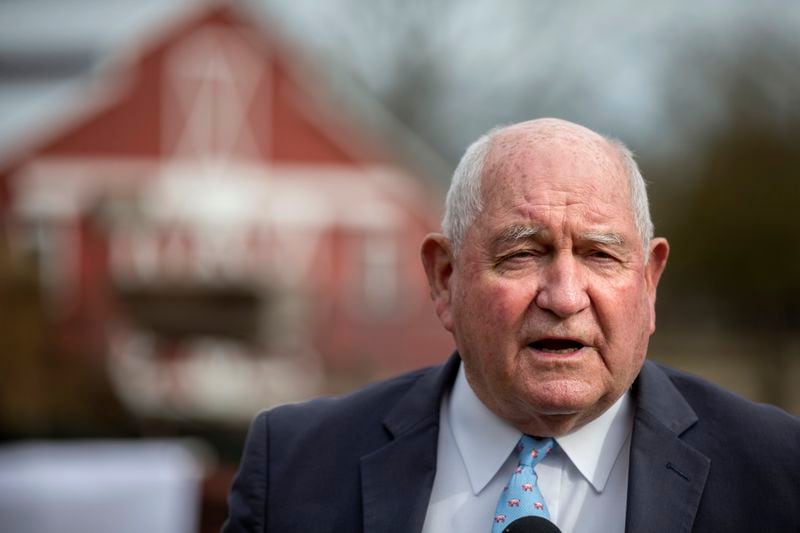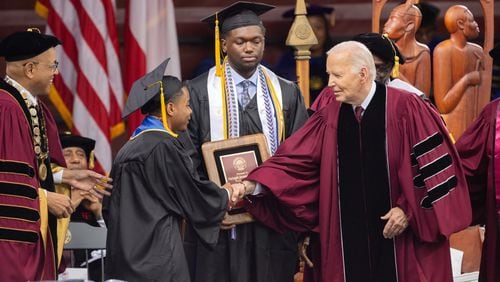State to pay $408 million to fund broadband expansion
Georgia will spend $408 million in COVID-19 relief money on internet expansion projects in 70 counties, connecting more than a quarter of the state’s locations currently not online.
The plan is expected to provide internet service to 183,600 locations across the state, including 132,000 homes and businesses that currently lack access.
State government leaders have planned for years to expand internet access to more of the 482,000 locations that lack sufficient services. Some of those areas have no internet service; others have slow connections, below 25 megabits per second for downloads.
Last year, the state allocated $20 million for rural internet construction.
Now, Georgia will spend more than 20 times that, using a share of the $4.8 billion that Democrats in Congress approved for the state last year as part of a coronavirus relief package.
The funding will target locations that are so spread out it’s unprofitable for internet companies to provide connections.
Grants will be provided to 49 recipients, including electric membership cooperatives and local governments that will partner with internet service providers.
Recipients were chosen by a committee Gov. Brian Kemp formed last year. Besides the federal funding, grant recipients are paying an additional $230 million in matching funds from their share of COVID-19 relief money, bringing the total investment in rural internet to more than $738 million.
The work must be completed by the end of 2026.
Credit: Stephen B. Morton for The Atlanta Journal Constitution
Credit: Stephen B. Morton for The Atlanta Journal Constitution
New regents could ease Sonny Perdue’s path to head University System
A few alterations to the state Board of Regents could help former Gov. Sonny Perdue clear the last hurdle to becoming chancellor of the University System of Georgia.
Perdue first surfaced in March as a candidate for the job leading the 340,000-student University System.
His candidacy then ran into some backlash when students and faculty members held rallies in opposition, noting he has no experience as a leader in higher education. He did, however, run the massive U.S. Department of Agriculture during the Trump administration.
A major accrediting agency then raised questions about whether politics was interfering with the selection process.
Perdue, upon confirming his interest in the job, told The Atlanta Journal-Constitution that he wanted to bring more conservative values to the position.
The resistance to Perdue left the Board of Regents unable to find enough support for him or any other candidate. The search process then saw a reboot in May after a firm charged with recruiting for the post abruptly quit.
Teresa MacCartney, a veteran state financial official, became the acting chancellor in July.
Now, though, the board has undergone some tinkering with a helpful hand from Gov. Brian Kemp, who remains close to Perdue even as he faces a challenge to his reelection from the onetime governor’s first cousin, former U.S. Sen. David Perdue.
Kemp named a political ally, Tom Bradbury, to serve on the 19-member Board of Regents. Meanwhile, two other members of the board, former Regents Chair Sachin Sailendra and Rachel Little have left the board because, after the Legislature’s special session on redistricting in November, they no longer live in the districts they represent.
That follows two other recent appointments to the board, when Kemp named key donors Tim Evans and Jim Syfan.
With that change in the lineup, the odds may be more in Sonny Perdue’s favor. People with knowledge of the situation say he is expected to formally interview for the job within weeks.
Walker outpaces his GOP competition
The field appears to be opening up for former running back Herschel Walker as he pursues a score in the GOP’s U.S. Senate primary.
Things are going well for Walker and not so much for the three other Republicans running against him: Agriculture Commissioner Gary Black, Air Force veteran and business owner Kelvin King and Latham Saddler, a former Navy SEAL who worked in the Trump administration.
New figures show Walker with a sizable advantage in campaign fundraising after he took in $5.4 million during the final quarter of 2021 and $5 million in the bank.
Some of the money Walker spent went back to his best-known supporter, former President Donald Trump. Walker’s campaign paid roughly $135,000 in catering and venue fees last year to Trump’s Mar-a-Lago resort, the site of a fundraiser for the candidate in December. The Washington Post found other Trump-backed candidates making similar payments.
Running second in the fundraising race is Saddler, who pulled in $600,000 for the quarter and has $1.7 million in cash on hand.
Black, the best known of Walker’s challengers, raised $440,000 over that time and has less than $1 million in funds.
That’s better than King, who raised $230,000 during the quarter and spent $350,000. He reported about $330,000 in cash on hand, plus a $300,000 loan he made to his campaign.
Walker is also faring much better than his GOP opponents in the polls.
A Quinnipiac University poll gave Walker about 80% of the vote, and an Atlanta Journal-Constitution poll showed him doing much better than Black in hypothetical matchups with Democratic U.S. Sen. Raphael Warnock.
His rivals aren’t ready to give up yet. In fact, they’ve done a little gang tackling.
Saddler has pointed out on Twitter that Walker has done little public campaigning to let voters know what he thinks.
Black, meanwhile, has unveiled a web series focused on “Herschelisms,” highlighting meandering stump speeches and verbal gaffes by Walker on those occasions when he does venture out on the campaign trail.
Abrams off to a fast start on fundraising
Democrat Stacey Abrams proved once again that she’s a master fundraiser, taking in more than $9.2 million since entering the race for governor in December.
Even over a shorter period, she outperformed a strong fundraising push by Republican Gov. Brian Kemp. He raised $7.4 million over the final six months of 2021 and has about $12.7 million in the bank.
Former U.S. Sen. David Perdue, the other big name in the race, mounting a challenge against Kemp in the GOP primary, has yet to disclose his fundraising figures. But he has tried to downplay expectations, saying the “status quo” fears him.
The race for governor is off to a hot pace that will likely surpass the record spending in Georgia’s 2018 contest, when campaigns and other interests spent more than $100 million. Abrams shelled out $27.4 million that year, when she narrowly lost to Kemp. He spent $21.4 million.
When that race ended, Abrams launched Fair Fight, a voting rights group that has collected more than $100 million in three years. It finished 2021 with roughly $19.5 million in the bank, and it is expected to boost Abrams and other Democrats this election cycle, just as it did in 2020.
Kemp has his advantages, though, including control over the budget. That’s allowed him to propose spending on pay raises and bonuses, pension increases and income tax refunds that could prove pleasing to various elements of the electorate.
Credit: Jiri Hera/Shutterstock
Credit: Jiri Hera/Shutterstock
Permit-less gun bill advances in state Senate
Legislation cleared the state Senate Judiciary Committee on a party-line vote to allow Georgians to carry concealed handguns without obtaining a state license.
The panel voted 6-3, with Republicans in favor, to advance Senate Bill 319, which would allow a “lawful weapons carrier” to carry a concealed handgun anywhere license holders currently are allowed.
That means guns will still be prohibited in places such as the secured areas of airports and government buildings that have security at the entrance, including the state Capitol. A lawful weapons carrier is defined as anyone who is now lawfully allowed to have a gun.
Guns cannot be purchased or carried by people with drug or felony convictions, those facing felony charges, anyone treated for mental health issues or substance abuse issues within the past five years, and others who have been involuntarily committed to a mental health hospital.
Gun rights advocates have pushed for years to end the state’s licensing process for firearms. They gained strong support this year from Gov. Brian Kemp — who faces a stiff GOP primary fight for reelection — when he called for passing legislation to allow the permit-less carrying of handguns.
State Sen. Elena Parent, an Atlanta Democrat, called the licensing process one of the few “checks and balances” to make sure that only people allowed to carry concealed handguns were granted a permit.
She said a report from the state’s probate courts — which issue concealed carry licenses in many counties — found that nearly 5,300 people were denied permits in 2020, many of them with criminal backgrounds. Parent indicated the true number is probably higher, since the data was shared voluntarily and not all counties participated. In some counties, the sheriff’s department issues concealed carry licenses.
Background checks still will be required when purchasing a handgun from a store or a dealer under SB 319. But private sales aren’t held to the same standard.
The bill’s sponsor, Republican state Sen. Jason Anavitarte of Dallas, said the licensing process “does not deter or (disincentivize) a criminal from carrying a firearm concealed.”
“They will do it regardless,” he said. “Permit-less carry gives criminals reason to fear that a potential victim could be armed, and thus (disincentivizes) criminal conduct.”
An Atlanta Journal-Constitution poll found last month that about 70% of Georgia voters do not believe Georgians should be allowed to carry a concealed weapon without a license.
Private school voucher bills advance
A pair of private school voucher bills are making early progress through the Capitol.
House Bill 60 and House Bill 999 would both give public school students about $6,000 a year in state subsidies to help cover tuition if they move to a private school. If a student switched to home-schooling, that money could cover other education-related expenses, such as tutoring.
HB 60 won passage in the House Education Committee, and HB 999 cleared a House Education subcommittee.
State Rep. Wes Cantrell, the lead sponsor for both bills helped sell them by highlighting recent outrage over issues such as critical race theory, controversial books and school policies during the pandemic.
“I submit to you today that if parents had a choice, that all of these issues would take care of themselves,” the Woodstock Republican said, “because schools would have to be more responsive to parents if they knew the parents could go to something else.”
Voucher supporters say the bills would leave public schools with more money per pupil, since the students who depart for private schools would only take state funding, leaving behind their share of local and federal dollars.
Opponents say vouchers divert funding from underfunded public schools. They also say low-income households are less likely to take advantage of vouchers since it would be harder for them to cover the gap between the state subsidy and full tuition.
Candidates, endorsements, etc.:
— Alec Poitevint, a former Republican National Committee member and onetime campaign chairman for Sonny Perdue, is backing Gov. Brian Kemp in his reelection bid against former U.S. Sen. David Perdue in the GOP primary.
— A super PAC supporting Republican Herschel Walker’s campaign for the U.S. Senate, 34N22, raised nearly $1 million from three major contributors: $750,000 from Home Depot co-founder Bernie Marcus; $100,000 from Joe Sanderson, the chief executive of Sanderson Farms; and $50,000 from Newtown Racuetball, an athletic club owned by Jim Worthington, best known, perhaps, for organizing three buses that ferried Donald Trump supporters to the rally that preceded the Jan. 6, 2021, attack on the U.S. Capitol.
— Christian Wise Smith, a former Atlanta city solicitor and onetime member of the Fulton County District Attorney’s Office, has launched a bid for the Democratic nomination for attorney general.
— Democratic state Rep. Bee Nguyen’s bid for secretary of state has gained the endorsement of outgoing Augusta Mayor Hardie Davis. Nguyen’s campaign also announced that it has raised just over $1 million.
— Holly McCormack, a Democrat running to unseat Republican U.S. Rep. Marjorie Taylor Greene, reported raising more than $650,000 in the last quarter of 2021.
— Jason Esteves, the veteran Atlanta school board president, has collected more than $120,000 in donations since announcing last month that he was running for the state Senate. Esteves, who still has $110,000 in the bank, is running for the seat Democratic state Sen. Jen Jordan is vacating to run for attorney general. Two union chapters, American Federation of State, County and Municipal Employees Local 1644 and the Georgia Federation of Public Service Employees, are backing Esteves.
— Restaurateur Long Tran said he will run in the newly redrawn House District 79, which spans parts of Chamblee, Doraville and Dunwoody. Democratic state Rep. Mike Wilensky, who currently represents the district, is not seeking reelection.










